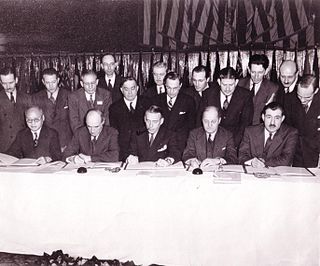International human rights instruments are the treaties and other international texts that serve as legal sources for international human rights law and the protection of human rights in general. There are many varying types, but most can be classified into two broad categories: declarations, adopted by bodies such as the United Nations General Assembly, which are by nature declaratory, so not legally-binding although they may be politically authoritative and very well-respected soft law;, and often express guiding principles; and conventions that are multi-party treaties that are designed to become legally binding, usually include prescriptive and very specific language, and usually are concluded by a long procedure that frequently requires ratification by each states' legislature. Lesser known are some "recommendations" which are similar to conventions in being multilaterally agreed, yet cannot be ratified, and serve to set common standards. There may also be administrative guidelines that are agreed multilaterally by states, as well as the statutes of tribunals or other institutions. A specific prescription or principle from any of these various international instruments can, over time, attain the status of customary international law whether it is specifically accepted by a state or not, just because it is well-recognized and followed over a sufficiently long time.

The law of war is the component of international law that regulates the conditions for initiating war and the conduct of warring parties. Laws of war define sovereignty and nationhood, states and territories, occupation, and other critical terms of international law.
There is no universal agreement on the legal definition of terrorism, although there exists a consensus academic definition created by scholars.

The Convention on International Civil Aviation, also known as the Chicago Convention, established the International Civil Aviation Organization (ICAO), a specialized agency of the UN charged with coordinating international air travel. The Convention establishes rules of airspace, aircraft registration and safety, security, and sustainability, and details the rights of the signatories in relation to air travel. The Convention also contains provisions pertaining to taxation.

Philippe Kirsch, is a Canadian lawyer who served as a judge of the International Criminal Court from 2003 to 2009 and was the Court's first president.

The 1926 Slavery Convention or the Convention to Suppress the Slave Trade and Slavery was an international treaty created under the auspices of the League of Nations and first signed on 25 September 1926. It was registered in League of Nations Treaty Series on 9 March 1927, the same day it went into effect. The objective of the convention was to confirm and advance the suppression of slavery and the slave trade.
The Philippine National Police Aviation Security Group (PNP-AVSEGROUP) is responsible for enforcing laws and regulations related to air travel in the Philippines.
Anti-terrorism legislation are laws with the purpose of fighting terrorism. They usually, if not always, follow specific bombings or assassinations. Anti-terrorism legislation usually includes specific amendments allowing the state to bypass its own legislation when fighting terrorism-related crimes, under alleged grounds of necessity.

United Nations Security Council resolution 1450, adopted on 13 December 2002, after reaffirming the principles of the United Nations Charter and resolutions 1189 (1998), 1269 (1999), 1368 (2001) and 1373 (2001), the Council condemned the attacks on Israeli targets in Kikambala and Mombasa, Kenya on 28 November 2002.
The Declaration on the Protection of Women and Children in Emergency and Armed Conflict was adopted by the United Nations in 1974 and went into force the same year. It was proposed by the United Nations Economic and Social Council, on the grounds that women and children are often the victims of wars, civil unrest, and other emergency situations that cause them to suffer "inhuman acts and consequently suffer serious harm".
The Hague Hijacking Convention is a multilateral treaty by which states agree to prohibit and punish aircraft hijacking. The convention does not apply to customs, law enforcement or military aircraft, thus it applies exclusively to civilian aircraft. The convention only addresses situations in which an aircraft takes off or lands in a place different from its country of registration. The convention sets out the principle of aut dedere aut judicare—that a party to the treaty must prosecute an aircraft hijacker if no other state requests his or her extradition for prosecution of the same crime.
The Convention for the Suppression of Unlawful Acts against the Safety of Civil Aviation is a multilateral treaty by which states agree to prohibit and punish behaviour which may threaten the safety of civil aviation.
The Convention for the Suppression of Unlawful Acts against the Safety of Maritime Navigation or SUA Act is a multilateral treaty by which states agree to prohibit and punish behaviour which may threaten the safety of maritime navigation.
The Protocol for the Suppression of Unlawful Acts against the Safety of Fixed Platforms Located on the Continental Shelf is a multilateral treaty by which states agree to prohibit and punish behaviour which may threaten the safety of offshore fixed platforms, including oil platforms.
The Beijing Convention is a 2010 treaty by which state parties agree to criminalise certain terrorist actions against civil aviation.
The law of extradition in the Republic of Ireland includes legislation and case law.
This page is based on this
Wikipedia article Text is available under the
CC BY-SA 4.0 license; additional terms may apply.
Images, videos and audio are available under their respective licenses.




